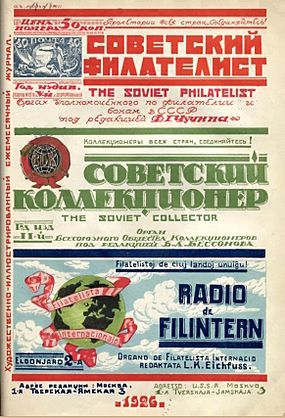Philatelic International facts for kids

Emblem of the organisation on the cover of its organ, magazine Radio de Filintern (in the combined issue with Soviet Philatelist and Soviet Collector)
|
|
| Abbreviation | Filintern |
|---|---|
| Motto | "Philatelists of the world, unite" |
| Formation | June 22, 1924 |
| Extinction | 1940s |
| Type | NGO |
| Legal status | international association |
| Purpose | philately, scripophily |
| Location |
|
|
Region served
|
world |
|
Membership
|
private persons |
|
Official language
|
Esperanto, English, French, German |
|
Editor
|
Leongard Eichfuss |
| Remarks | 102 members (1924) |
Philatelic International, often called Filintern, was a special international club for stamp collectors and people who collected paper money (called scripophilists). It existed from the 1920s to the 1940s. Its main goal was to connect collectors from all over the world, especially those who were also workers.
Contents
How Filintern Started
Filintern was created at a big meeting in Moscow, the capital of the Soviet Union, from June 22 to 30, 1924. Many groups were excited about its formation. These included different parts of the All-Russian Society of Philatelists. Also, Soviet people who spoke Esperanto (an international language) welcomed the new organization.
At the start of the meeting, Feodor Chuchin gave a speech. He was in charge of philately and scripophily for the government. He said that Filintern would help everyone follow the rules of international stamp collecting. He also said they would make sure others followed these rules too.
Filintern's Main Goals
Filintern had several important goals for its members. These goals were written down for its main magazine.
One goal was to bring together stamp collectors who were also workers from all countries. They wanted to work together against stamp dealers who might not be fair.
Another goal was to make "ideological philately" more popular. This meant using stamp collecting to share certain ideas or beliefs.
Finally, Filintern wanted to use Esperanto in stamp collecting. This would help collectors from different countries talk to each other easily.
What Filintern Members Could Do
Filintern helped people who loved collecting stamps, paper money, and speaking Esperanto.
Members could collect stamps and paper money together. They could also publish special newsletters, magazines, and lists of stamps (catalogues). Most importantly, Filintern made it easier for members to trade stamps and money with collectors in other countries.
The Soviet government also hoped that using stamp collecting, paper money collecting, and Esperanto would help spread their ideas, like communist ideas, to people in other countries.
Filintern's Magazine
The main magazine for Philatelic International was called Radio de Filintern. A well-known Russian stamp collector named L. K. Eichfuss was its editor. The very first issue of this magazine came out in January 1925.
Related Pages
 | Calvin Brent |
 | Walter T. Bailey |
 | Martha Cassell Thompson |
 | Alberta Jeannette Cassell |

